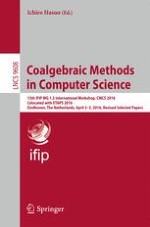2016 | Buch
Coalgebraic Methods in Computer Science
13th IFIP WG 1.3 International Workshop, CMCS 2016, Colocated with ETAPS 2016, Eindhoven, The Netherlands, April 2-3, 2016, Revised Selected Papers
herausgegeben von: Ichiro Hasuo
Verlag: Springer International Publishing
Buchreihe : Lecture Notes in Computer Science
